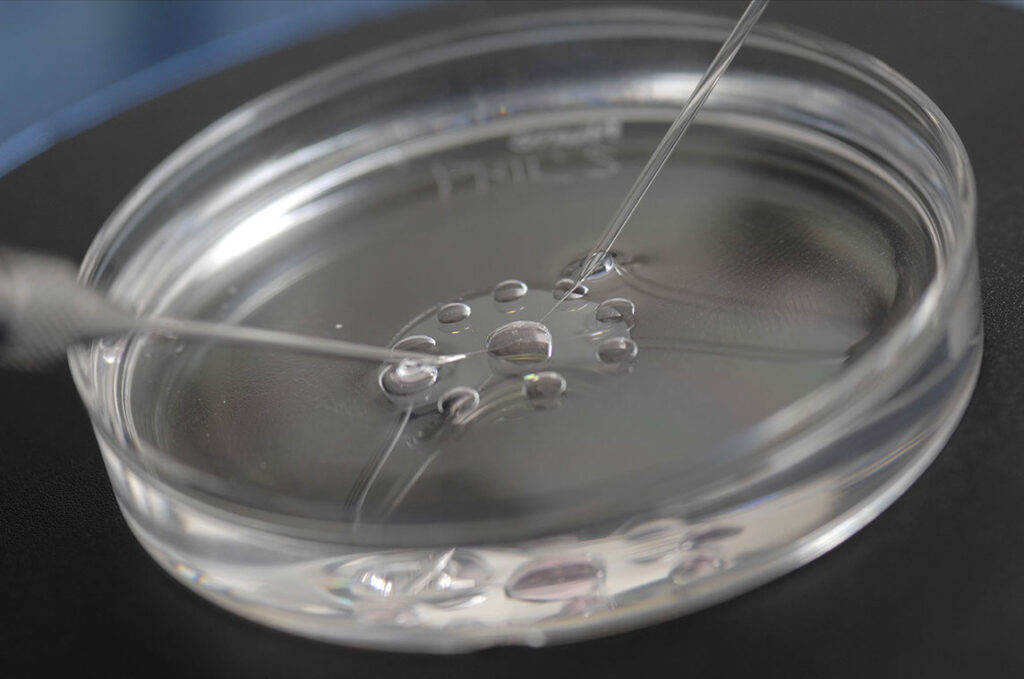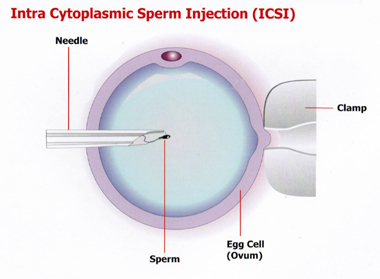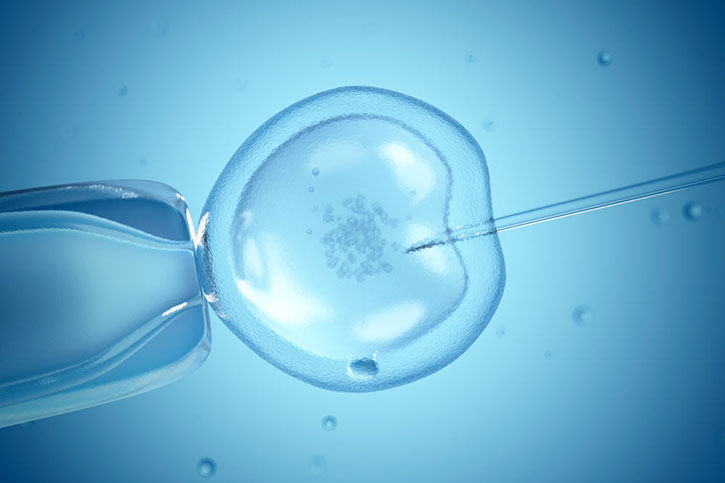Intra Cytoplasmic Sperm Injection(ICSI)

Intracytoplasmic sperm injection (ICSI) is an in vitro fertilization laboratory procedure in which a single sperm is injected directly into an egg, using a glass needle ( pipette) This process increases the likelihood of fertilization when there are abnormalities in the number, quality, or function of the sperm.
Fertilization occurs in 50% to 80% of injected eggs. Approximately 40% of all ICSI cycles performed in resulted in a live birth, which is comparableto rates seen with traditional IVE Younger patients may achieve even more favorable results. Factors such as poor egg quality and advanced maternal age may result in lower rates of success.
ICSI
ICSI (IntraCytoplasmic Sperm Injection): Males with very low sperm counts (less than 5million per ml) or poor quality sperms had no hope of fatherhood. This problem was surmounted by ICSI. In ICSI all the steps are similar to the procedure of IVF, except the step of fertilization. In ICSI each egg is held and injected with a single live sperm. This micro-fertilization is done with the help of a machine called the Micromanipulator. ICSI is done where egg is held and injected with single live sperm. It is cultured for 2-3 days and good quality of 3 embryos are usually placed in the woman’s uterus, 2 or 3 days after ICSI.
How is ICSI done?
In ICSI, the sperm is injected directly into the egg. The fertilized egg grows in the laboratory under suitable conditions to form an embryo. After the embryo develops optimally, it is transferred in the women’s womb.
ICSI Treatment Facts
- ICSI Treatment is recommended when there are only a few good sperms available for fertilization.
- Men with lower sperm count, blockage in their reproductive tract, abnormal or low sperm motility may try out ICSI
- ICSI side effects may include multiple pregnancies, miscarriages and inherited genetic disorders from parents to the new born
- Chances of the baby having major birth defects are only around 1.5% to 3 %; very similar to babies conceived naturally.
- The success rate of ICSI Treatment is somewhat similar to that of IVF ranging around 30%-40%. However, younger women have higher success rate.
ICSI Treatment at SRI ANKURA FERTILITY CENTRE
At SRI ANKURA FERTILITY CENTRE , we follow a channelized procedure for ICSI Treatment. The initial stage involves an extensive discussion with the couple. This helps them to understand why they need to go for ICSI Treatment and what are the steps involved in the process. We believe in sharing or plan of action with our patients. We want to guide them to have a uniformed decision making.
- The steps involved in ICSI Treatment are somewhat similar to IVF, where the ovaries are stimulated under proper medical vigilance to extract healthy eggs.
- The semen is washed to identify the healthiest and fittest sperm to be used for fertilization
- The sperm is then directly injected into the egg for embryo formation
- After the proper development of the embryo that generally takes 3-5 days, it is transferred to the woman’s uterus.
ICSI Treatment done by the trained and highly-efficient embryologist of SRI ANKURA FERTILITY CENTRE , makes is look easier that it actually, We ensure that the couples undergoes a complete investigation for genetic and chromosome related abnormalities. This ensures the baby does not inherit any of these disorders. The complete care and efficient diagnosis makes SRI ANKURA FERTILITY CENTRE one of the best ICSI clinic in Tirupati.
Why ICSI Treatment fails?
Well, there are chances that you may not be able to conceive even after an ICSI Treatment. Though in this process nearly 50%-80% of the eggs get fertilized. A failed ICSI Treatment cycle may have various reasons, some of which are
- The age of the women
- Low quality sperm or unavailability of good eggs
- The embryo may not develop or stop developing after a certain stage
- Chromosome related problems or lack of optimal blood flow to the womb
What after a failed ICSI Treatment?
It is very difficult to bounce back after a failed ICSI Treament. We understand that it is quite nerve wrecking to accept the fact that you do not see success even after taking up such expensive treatment and enduring so much trouble. It is quite natural that you might think to stop the treatment.
We at SRI ANKURA FERTILITY CENTRE, can understand you more than anyone else does. We would advice you against quitting the treatment process. Quitting means putting an end to all efforts that you have taken to reach so far. We are just a few steps away, waiting to show you the right direction.
You can always have the experts at SRI ANKURA FERTILITY CENTRE sitting with you, researching to find out what exactly went wrong and get it corrected in the next cycle.



